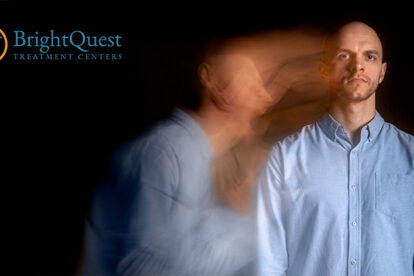Early Warning Signs of Psychosis and How to Recognize the Symptoms

Psychosis is an episode of disturbed perceptions and thoughts that affect interpretation of reality. The most characteristic signs of psychosis are hallucinations and delusions. A psychotic episode is often preceded by early warning signs. It is important to pay attention to these, especially in someone with risk factors for a psychotic disorder, like schizophrenia. These conditions can be extremely disruptive, but early care can change the course of symptoms and future episodes.
Psychosis is more common than many people realize. By some estimates, 3 percent of people will have at least one episode of psychosis during their lifetimes. Even so, it is still not a common occurrence. Psychosis is also highly stigmatized. These roadblocks make it all too easy to ignore early warning signs in yourself or in someone you care about.
A psychotic disorder can be devastating and a lifelong struggle, but early intervention can change the entire course of the disease. If you can recognize early warning signs, get screened, and get professional help, the outcomes are likely to be significantly better than if you ignore them and go without care.
What Is Psychosis?
Psychosis is a state of mind characterized by being out of touch with reality. It is also a word used to describe conditions that cause this state of mind. During a psychotic episode, a person has disturbed or disrupted perceptions and thoughts. This makes it difficult or impossible to distinguish between what is real and what isn’t. The main symptoms of psychosis include:
- Hallucinations
- Delusions
- Incoherent speech
- Behaviors and reactions inappropriate to a given situation
Someone with psychosis will also exhibit other signs as a result of these, like social isolation, difficulty functioning in normal situations, poor hygiene, depression, lack of motivation, anxiety, changes in sleeping patterns, and more.
Illnesses like Alzheimer’s disease and brain tumors, and also drugs and medications, can trigger psychosis. Mental illnesses that cause psychotic episodes include schizophrenia, delusional disorder, bipolar disorder, and schizoaffective disorder.
The Importance of Detecting Early Psychosis
Psychosis is a serious health concern. It can lead to self-harm, suicide, substance abuse, and social isolation. Left untreated, psychotic conditions can lead to many more problems due to the inability to function normally: job loss, poverty, homelessness, and more.
When psychosis is caused by a medication, a drug, a tumor, or a medical condition, managing it is a matter of treating the underlying cause. When psychosis results from a mental illness, recovery and management are more complicated.
Living with a psychotic disorder means living with a chronic illness. It requires ongoing care, usually for the rest of the person’s life. There is no full recovery, but professional care can help reduce symptoms and psychotic episodes, and help a person function better and live more independently.
Early intervention makes a big difference. Studies have shown that when patients get treated during the early stages of psychosis, or even before a first full episode of psychosis, the outcomes are better. Patients have fewer, milder symptoms and are better able to function. Research also shows that early intervention reduces recurrence of psychotic episodes.
What Are the Important Early Warning Signs?
The evidence clearly shows that early management of psychotic conditions leads to better outcomes for individuals. The challenge is to detect and diagnose psychosis early. If you have a loved one with some of the warning signs that occur before an actual episode of psychosis, push for a psychiatric evaluation as soon as possible:
- Worrying changes. In a young person, this may be an unexpected decline in academic performance. Changes in work performance can also indicate early psychosis. At any age, a decline in hygiene and general self-care is also a sign. These troubling changes may be a result of difficulty concentrating, a common issue in early psychosis.
- Suspicion of others. Many people start to become wary of others before having a psychotic episode. They become suspicious with no reason and are uneasy around other people, even those they know and should trust.
- Isolation. Early psychosis can lead to isolation, often because of this wariness of others. You may see someone spend more time alone, even if they don’t become totally isolated.
- Unusual emotional reactions. Emotional reactions may seem out of line with the circumstances during this period. A person may overreact or underreact to situations, exhibiting strong emotions or acting flat and unemotional.
- Changes in mood. Mood disturbances alone do not indicate psychosis, but with other symptoms can be a warning sign. You may see signs of depression, anxiety, agitation, anger, and mood swings.
One study of young people all with risk factors and warning signs for psychotic disorders pinpointed the most predictive early symptoms. Those with significant decreases in normal functioning, depression, reduced ability to focus and pay attention, and a longer duration of early symptoms were most likely to develop actual psychosis later.
The early warning signs of psychosis often appear in adolescence and early adulthood. This can make it particularly difficult to recognize them as a mental health condition. It’s better to get an assessment from a doctor than to just write these signs off as typical teen behavior.
What Are the Signs of a First Episode of Psychosis?
The early warning signs of psychosis are gradual. You won’t see someone you love become psychotic overnight. This makes identifying the first true episode difficult. If you’ve missed the warning signs, don’t hesitate to seek an evaluation for what seems like a psychotic episode. The sooner you can get help the better.
A first episode of psychosis may include the following symptoms:
- Delusions, or thinking and believing things other say are not true
- Seeing, tasting, or feeling things that others do not
- Strong, inappropriate emotions
- Lack of emotional response
- A rapid decline in personal hygiene
- Ongoing and worsening withdrawal from family and friends
- Difficulty thinking clearly
Psychosis includes hallucinations and delusions, but they may be less severe during the first episode. There is still time, at this point, to benefit from starting care right away as opposed to waiting for additional episodes.
Begin Your Recovery Journey Today.
619-466-0547Identifying High-Risk Individuals
A big challenge of detecting early psychosis is the fact that no one really expects to be psychotic or for a loved one to have a psychotic condition. It’s more common than most people realize but still not common enough to be on your radar.
More people could be screened and identified as having early warning signs of psychosis if more people understood the risk factors. The most important risk factor is family history. Anyone with immediate or even extended family members with psychosis has a significant risk of developing a psychotic condition.
Also important is trauma. Any type of trauma can contribute to or increase the risk of developing psychosis later, but those who experienced it in childhood and for longer may have a greater risk. Substance use can increase the risk of psychosis in people already vulnerable to it, such as those with family history.
Getting Screened and Treated
If you’re not sure where to go when you see early signs of psychosis, start with your primary doctor or your pediatrician for a teenager. They can give you advice and referrals to someone who can provide a more complete psychiatric evaluation.
Your doctor can also rule out any other underlying causes, such as a medical condition or medication that is triggering symptoms. During a psychiatric screening, a mental health professional will observe you or your child, ask questions, and look for symptoms of mental illness.
Treatment for a psychotic episode may require drastic management strategies, including hospitalization. But, if you catch the early warning signs, interventions are less severe. You can benefit from psychotherapy, psychosocial interventions, and medications. You may also benefit from intensive therapy and care in a residential setting to provide a solid foundation for managing your illness in the future.
The most important thing you can do is ignore stigma and get screened. It’s better to get troubling symptoms checked than to risk you or your child experiencing full-blown psychosis. Early interventions work. They can reduce symptom intensity and frequency, and in some cases, even prevent onset of illness entirely.






